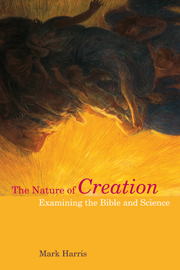Book contents
- Frontmatter
- Contents
- Preface
- Abbreviations
- 1 Introduction
- 2 Creation According to Modern Science
- 3 Creation According to the Bible I: Genesis
- 4 Creation According to the Bible II: The Creation Motif
- 5 The Framework of Biblical Cration
- 6 Creator–creation: How can a Ralationship be Described?
- 7 The Fall
- 8 Suffering and Evil
- 9 Scientific Eschatology and New Creation
- 10 Conclusions
- Bibliography
- Index of Ancient Citations
- Index
1 - Introduction
- Frontmatter
- Contents
- Preface
- Abbreviations
- 1 Introduction
- 2 Creation According to Modern Science
- 3 Creation According to the Bible I: Genesis
- 4 Creation According to the Bible II: The Creation Motif
- 5 The Framework of Biblical Cration
- 6 Creator–creation: How can a Ralationship be Described?
- 7 The Fall
- 8 Suffering and Evil
- 9 Scientific Eschatology and New Creation
- 10 Conclusions
- Bibliography
- Index of Ancient Citations
- Index
Summary
SCIENCE AND RELIGION: A CONFLICT OR A NEGLECT?
The relationship between modern science and religious belief has become one of the most debated matters of our time. It is impossible not to hold an opinion on it. While there are many who claim that science has made religious belief redundant, there are at least as many who insist that faith is alive and well.
At the same time, a flourishing academic discipline has grown up which has attempted to find a way forward by building bridges. This field – “science and religion”, or “theology and science” – has tended to concentrate on historical discussions of how the two areas have interacted in the past, and on philosophical investigations which seek understanding of how they might mutually benefit each other now. In this, history and philosophy have taken mediatorial roles between science and theology. But this has meant that the dialogue between science and religion has operated at a “meta” level, at least one remove from the basic data and core observations which underlie them. Discussion has therefore largely been about how to relate higher-level scientific and religious interpretations to each other, not about the core data and their interpretation. Much of the science–religion dialogue has taken place in the Western world, where the “religion” half of the pairing has been Christianity. In this case, the core data are defined to a large extent by a set of scriptures, the Bible. It is this foundational book above all which has suffered from a general lack of engagement in the science–religion dialogue.
- Type
- Chapter
- Information
- The Nature of CreationExamining the Bible and Science, pp. 1 - 14Publisher: Acumen PublishingPrint publication year: 2013



